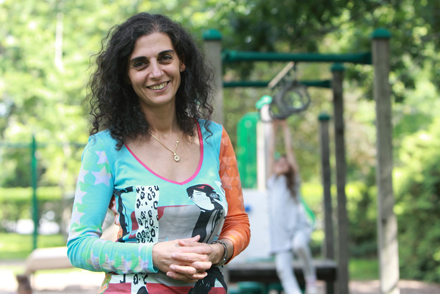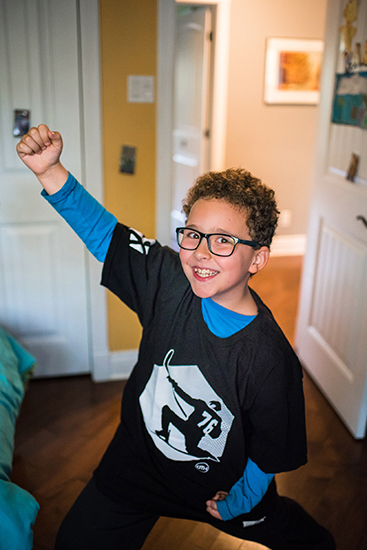
In Canada, cancer remains the leading cause of illness-related death in children. In an effort to accelerate research breakthroughs and ensure a faster path to a cure for children living with resistant, recurrent or metastatic cancer, more than 30 pediatric research centres and non-profit organizations are joining forces to support the PRecision Oncology For Young peopLE (PROFYLE) program, an initiative of the Terry Fox Research Institute. This unique partnership represents $16.4 million in funding, over a quarter of which will come from Quebec.
Terry Fox PROFYLE seeks to tap into world-renowned Canadian expertise in genomics and pediatric oncology. The program uses real-time molecular profiling to personalize treatment for patients with tumours that are difficult to treat with conventional therapy, no matter where they live in Canada. Eight-year-old Karl from the greater Montreal area is one of these patients.
Karl was six when he and his parents found out that a persistent pain in his arm was in fact ganglioglioma, for which the prognosis in children is less than encouraging. “It was such a shock. We could barely wrap our heads around it,” his mother Josée recounted. They were told that the chances of being able to completely remove Karl’s tumour, which was lodged in his brain stem, were slim and that the repercussions could be serious. Fortunately, an experimental treatment was available through Terry Fox PROFYLE. “Instead of undergoing highly complex surgery, Karl is taking a pill to shrink the tumour. This has given him back his mobility and let him return to school.”
Although 80 per cent of pediatric cancer patients now survive, the outlook for the remaining 20 per cent continues to be grim. Terry Fox PROFYLE Program Director Dr. David Malkin of the SickKids Hospital in Toronto is delighted to see specialists in precision medicine converge for the first time and work together instead of in their respective silos. This is the key to modern-day medical advances.
The medicine of tomorrow in Quebec
Dr. Nada Jabado, a senior scientist with the Child Health and Human Development Program at the Research Institute of the McGill University Health Centre (RI-MUHC) and a pediatric hematologist-oncologist at the Montreal Children’s Hospital of the MUHC, is a primary physician for children with brain tumours. “The PROFYLE initiative is an unprecedented catalyst for collaboration among Canadian scientists who are tackling particularly aggressive, hard-to-treat forms of pediatric cancer. I am proud of the synergy between our two teams in Quebec and of the expertise we’ve developed in studying genetic biomarkers that we can bring to this massive undertaking,” said Dr. Jabado, leader of the PROFYLE biomarker node. “Our goal is to find a cure for all children living with cancer, and with PROFYLE we are taking a giant leap forward. By sharing our knowledge and our know-how, we will maximize our chances of success in reaching out to children in need and their families.”

Professor Daniel Sinnett, senior scientist and head of the laboratory of genomic determinants of childhood leukemia, part of the Charles-Bruneau Research Unit in Immunology, Hematology and Oncology at CHU Sainte-Justine, agrees. “Our dream is to defeat cancer through research. By joining forces to take our work to the next level, we can make the most of our resources to greatly benefit children across the country. This nationwide collaboration will enable us to strengthen the leadership of our pediatric oncology teams,” he stated.
“With precision medicine, we can develop molecular profiles that will show us how a disease is likely to progress so we can determine the most effective course of treatment to recommend to children and their families. These personalized treatments adapted to the needs of individual patients will help better our chances of finding a cure,” he added.
Quebec is contributing more than a quarter of the initial $16.4 million in funding, by way of several prominent donors, namely the Charles-Bruneau Foundation – the lead Quebec partner in this initiative, Sarah’s Fund for Cedars / Cedars Cancer Foundation, the Montreal Children’s Hospital Foundation and the CHU Sainte-Justine Foundation.
“At the Charles-Bruneau Foundation, we are proud not only to be continuing our fight against childhood cancers through a generous contribution to this research initiative, but also to be extending the scope of our work to a national scale,” said Rébecca Dumont, chief executive of the Charles-Bruneau Foundation. “Curing children with cancer is what our foundation is all about. It is with pride and confidence that we are working hand in hand with Sainte-Justine and the Montreal Children’s Hospital, two vital partners in Quebec, to advance the frontiers of knowledge and bring hope of a cure to all children.”
Funding for this initiative, which will be spread out over five years, is expected to grow as new donors are added.
Watch the Terry Fox PROFYLE patient video below to learn more about how the project is helping young Canadians.
